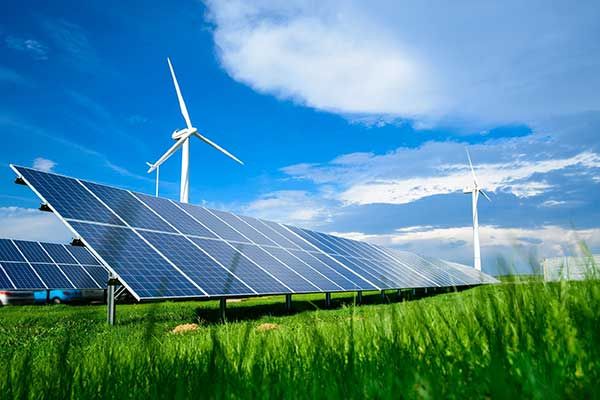Azerbaijan charts greener path, from fossil fuel reliance to renewable leadership

As the world accelerates its transition to sustainable energy, Azerbaijan is steadily positioning itself as a pivotal player in the regional and global green energy landscape. The country’s growing portfolio of renewable energy projects, bolstered by international partnerships and strategic investments, reflects both its climate commitments and its geopolitical ambitions. A recent series of high-level meetings in the Philippines highlights the next phase of Azerbaijan's green energy diplomacy and investment strategy.
At the "2025 Asia Clean Energy Forum" in Manila, representatives from the Asian Development Bank (ADB) and the Asian Infrastructure Investment Bank (AIIB) convened to discuss potential financing models for green energy initiatives in Azerbaijan. The Azerbaijani delegation, led by Deputy Minister of Energy Orkhan Zeynalov, presented the country’s renewable energy goals, regional cooperation strategies, and green infrastructure priorities.
Zeynalov’s remarks during the panel "Green Corridors for a Shared Future of the Central, West and East Asian Regions" underscored Azerbaijan’s long-term strategy to transition to clean energy, not only as a domestic policy objective but also as a pillar of foreign policy and economic diversification. Key focus areas included renewable energy capacity expansion, cross-border electricity infrastructure, and alignment with COP29 goals, with Azerbaijan serving as the host of the 2024 UN Climate Conference.
The discussions extended to a roundtable with Central Asian countries—Kazakhstan, Uzbekistan, and Kyrgyzstan—exploring the Central Asia–Azerbaijan Green Energy Corridor. This corridor is envisioned as a vital link in the broader Eurasian energy ecosystem, integrating energy markets and facilitating green electricity trade from Central Asia to Europe through the South Caucasus.
Perhaps the most transformative component of Azerbaijan’s green energy agenda is its emergence as a future exporter of renewable electricity to Europe. The centerpiece of this vision is the Caspian-Black Sea-Europe Green Energy Corridor, a mega-project involving Azerbaijan, Georgia, Romania, and Hungary. Signed in December 2022, the agreement outlines the construction of a 1,195-kilometer undersea cable beneath the Black Sea, capable of transmitting 1,000 megawatts of electricity from Azerbaijan to Europe.
Once operational, the corridor is expected to enable the export of up to 4 gigawatts of renewable electricity, primarily generated by large-scale wind farms in Azerbaijan. This project is not only a testament to Azerbaijan’s technical capabilities and natural potential in wind energy but also a strategic instrument of energy diplomacy. In an era where energy security is increasingly tied to green sources, this corridor offers European nations a vital alternative to conventional energy imports.
Azerbaijan’s pivot toward green energy is inseparable from its broader economic diversification strategy. For decades, the Azerbaijani economy has been heavily reliant on oil and gas revenues, making it vulnerable to fluctuations in global energy markets. Recognizing this, the government has set ambitious renewable energy targets—6 GW of installed capacity by 2030—backed by legislative reforms, foreign investment incentives, and institutional support.
Green energy diversification also enhances Azerbaijan’s strategic importance in the global energy transition. The country sits at the crossroads of Europe and Asia, giving it a unique opportunity to serve as a green energy bridge between the energy-rich Central Asian countries and energy-demanding European markets. This role is further reinforced by Baku’s active engagement in regional cooperation frameworks and its leadership in initiatives like COP29.
Azerbaijan’s diplomatic energy extends beyond Central Asia and Europe. At COP29 in Baku, a trilateral agreement was signed with Kazakhstan and Uzbekistan to foster cooperation on green hydrogen and ammonia technologies. This collaboration underscores Azerbaijan’s commitment not just to electricity export but also to next-generation renewable fuels, positioning it ahead of many regional peers.
Moreover, Azerbaijan is deepening its ties with Bulgaria, Turkiye, and Georgia through a draft Memorandum of Cooperation signed in February 2025. The memorandum outlines joint efforts to modernize grid infrastructure, expand transmission capacity, and promote investment in renewable energy projects. By forging these multilateral partnerships, Azerbaijan is crafting an integrated green energy network that spans the South Caucasus, the Balkans, and Central Asia.
While challenges remain—ranging from financing needs to infrastructure readiness—Azerbaijan’s trajectory in green energy is marked by ambition, clarity of vision, and increasing international support. The Manila meetings with ADB and AIIB point to a growing recognition of Azerbaijan’s role in the global clean energy transition. With the right investment, policy alignment, and regional cooperation, Azerbaijan is well-positioned to transform from a traditional hydrocarbon supplier into a green energy powerhouse of the wider Eurasian region.
In a world racing against the clock to achieve net-zero emissions, Azerbaijan’s evolving green energy strategy offers a compelling case study in how resource-rich countries can reimagine their economic future while contributing to global sustainability.
Here we are to serve you with news right now. It does not cost much, but worth your attention.
Choose to support open, independent, quality journalism and subscribe on a monthly basis.
By subscribing to our online newspaper, you can have full digital access to all news, analysis, and much more.
You can also follow AzerNEWS on Twitter @AzerNewsAz or Facebook @AzerNewsNewspaper
Thank you!

